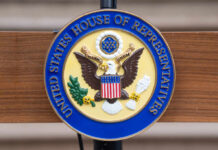
During a heated debate on a $61 billion foreign aid package for Ukraine, Rep. Gerald Connolly (D-VA) showed the establishment’s cards when he said, “The Ukrainian-Russian border is our border.” The inflammatory comment came during debate in which America First House Republicans voiced strong opposition to new billions of unaccountable taxpayer funding of the Ukrainian regime as the American border continues to stand wide open to invasion.
Connolly’s remarks emphasized the ideological divide he perceives between “depraved autocracy and freedom-loving people,” framing the conflict as a direct investment in democratic values globally. His claim was, of course, met by overwhelming Democratic support for the aid package, which ultimately passed in the House and garnered votes from 101 establishment Republicans.
@ZelenskyyUa canceled elections, arrested priests, arrests mayors, arrests press members, drove away 400,000 fighting men from Ukraine 🇺🇦 who didn’t want to fight, and has squandered billions in aid
🇺🇸 weapons being smuggled throughout region
— NOVA Campaigns (@NoVA_Campaigns) April 20, 2024
Meanwhile, Rep. Marjorie Taylor Greene (R-GA) blasted House Speaker Mike Johnson (R-LA) for his leadership in bringing the Ukraine aid bill to the floor. Greene is spearheading efforts to challenge Johnson’s speakership with a motion to vacate. So far, only two fellow House Republicans have publicly supported her motion, Reps. Thomas Massie (R-KY) and Paul Gosar (R-AZ).
Mike Johnson’s Speakership is OVER!
He has betrayed Republicans by handing the gavel to Joe Biden, Chuck Schumer, Hakeem Jeffries, and the rest of the Democrats.
He betrayed us on border security.
He betrayed us on funding endless foreign wars.
He betrayed us on FISA.
He… pic.twitter.com/zUquP3DNFH
— Rep. Marjorie Taylor Greene🇺🇸 (@RepMTG) April 21, 2024
While aiming to highlight the moral and strategic imperatives of supporting Ukraine, Connolly’s remarks reflect a disconnect with constituents who are more concerned with protecting U.S. citizens before the country borrows and prints billions of new dollars to be shipped overseas.
The debate is not merely about foreign aid but about the priorities and direction of U.S. governance. In that 112 House Republicans voted against the bill, there is clearly a substantial movement among the GOP base demanding a fundamental reassessment of how America engages globally while protecting citizens at home.
As Republicans work to find a consistent message for Americans who have grown weary of “Bidenomics” and the White House’s promotion of an open southern border, the decisions made in the near future will undoubtedly shape the outcome of this November’s elections. Republicans must immediately get their house in order if they expect a legitimate chance to control either house of Congress next year.



























